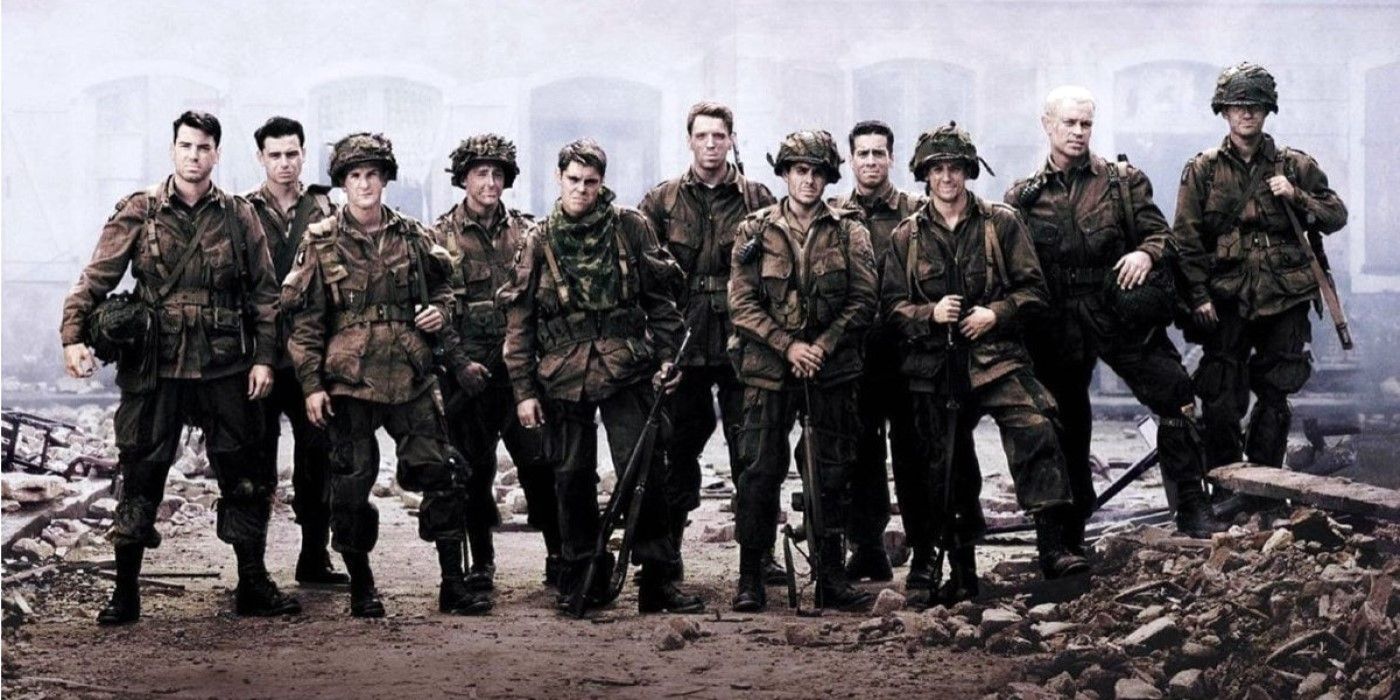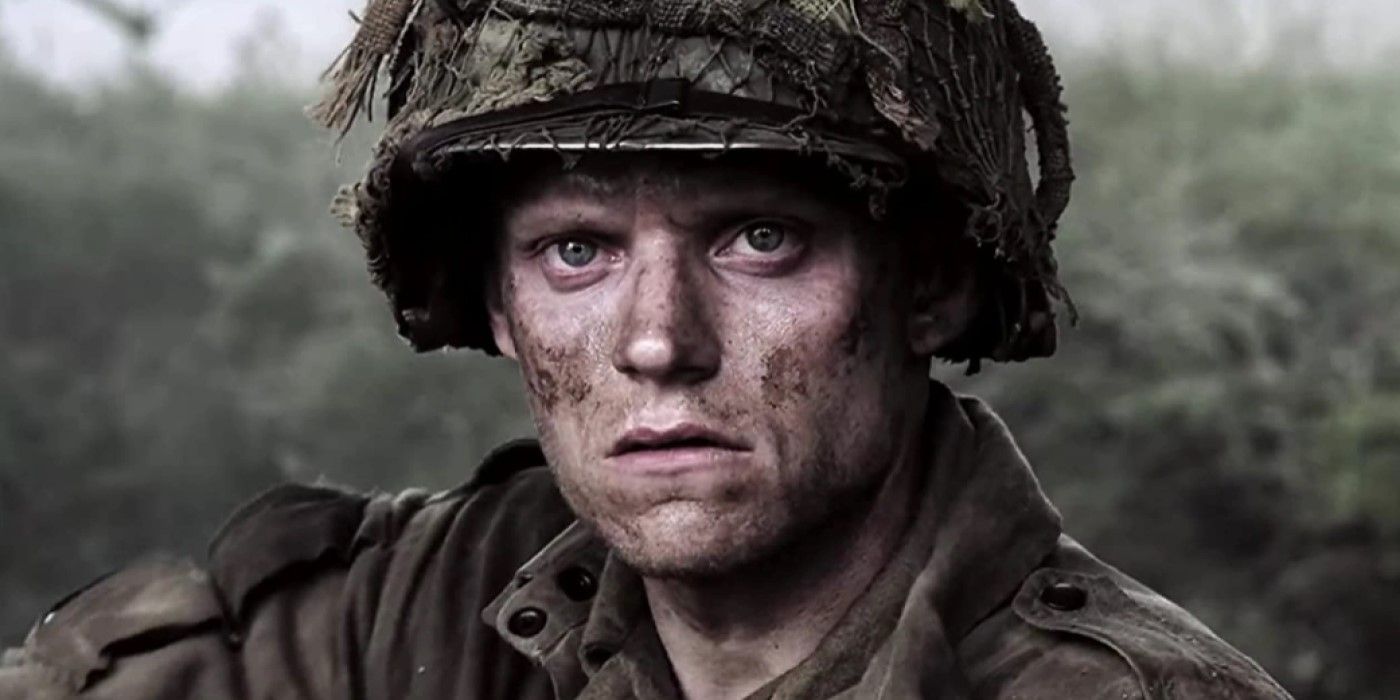The Big Picture
- Band of Brothers is praised as one of the most historically accurate World War II projects, but it does have some minor and major inaccuracies.
- Tanks and their usage in the series have been criticized by historians for being historically inaccurate.
- The series downplays certain human stories and fails to give attention to important narratives, such as the story of Augusta Chiwy, a Black nurse who saved countless lives during the war.
The epic miniseries Band of Brothers is among the best World War II projects of all time, based on the book of the same name by Stephen E. Ambrose. It follows the soldiers of E (“Easy”) Company, 2nd Battalion, 506th Parachute Infantry Regiment of the 101st Airborne Division from their start in 1942 up to the end of World War II. The series, the first of three miniseries which includes The Pacific and the upcoming Masters of the Air (premiering on Apple TV+ on January 26, 2024), has been praised, rightly, as one of the most historically accurate, with a realism and intensity that brought the war to vivid life onscreen. However, it doesn’t mean that it isn’t without its inaccuracies. Most are minor, like saluting with the left hand and not the right in one instance, but there are some “Major” inaccuracies as well.
‘Band of Brothers’ Is Historically Accurate — To a Point
Tanks, or how they were used, is one problem that historians have with Band of Brothers. In Episode 3, “Carentan,” the German forces are seen using a Jagdpanther, a World War II tank destroyer, in their counter-attack during the Battle of Carentan. It may look good onscreen, but would never have been there in the first place. The Battle of Carentan took place between June 10, 1944, and June 14, 1944, but the Jagdpanthers were only used later in the Battle of Normandy, which ran from June 6, 1944, to August 30, 1944, against British units. At the time of the battle, the closest Jagdpanthers in the area were in the German 654th Heavy Antitank Battalion, who were not involved. Another inaccuracy involving tanks had more to do with enforcing Hollywood stereotypes than maintaining accuracy. The questionable scene sees a “macho” Easy Company soldier telling a British tank commander to fire through a house to hit a hidden German tank. The “restrained” British soldier declines, as he is prohibited from creating “unnecessary destruction of property.” The entire dialogue is bogus, as not only did the order never exist, but forces on both the Allied and Axis sides were all guilty of causing “unnecessary” property damage.
Some of the human stories were downplayed in Band of Brothers as well. In “Points,” the final episode, Major Richard Winters (Damian Lewis) is offered a Luger by a German soldier as a show of surrender, but tells the man to keep his gun as a show of respect, another testament to his honor. In reality, Winters did take the gun, a Walther PP pistol. Upon examination, he realized that the gun had never been fired, which arguably would have been a more impactful moment in the series. In another instance, Technical Sergeant Donald Malarkey (Scott Grimes) formed a relationship with a German POW who had grown up in the same town as himself. This moment is downplayed as the real story is almost too coincidental to be true, as Malarkey and the POW actually worked across the street from each other for years.
Another story that wasn’t fleshed out completely is that of “Anna” (Rebecca Okot), a Black nurse from Congo. “Anna” is actually a Belgian nurse by the name of Augusta Chiwy, who was awarded the Civilian Award for Humanitarian Service for her “selfless service and bravery.” She saved countless lives, despite an American regulation stipulating that Black nurses could not treat white soldiers (a young Army doctor, John Prior, simply told them “you either let her treat you or you die”). Even though not everyone’s story could fit in the narrative, it is a shame that stories like these were not given the attention they warranted.
‘Band of Brothers’ Three Biggest Sins
However, there are three elements that stand as Band of Brothers‘ biggest sins: Private Albert Blithe (Marc Warren), First Lieutenant Norman Dike (Peter O’Meara), and der Führer himself, Adolf Hitler. In “Carentan”, one of the key characters is Private Blithe, who is seen suffering from shell shock and temporary blindness before shaking it off and going back into action. As the episode nears its end, a German Sniper shoots Blithe in the neck while he is on a patrol. Before the credits, a statement notes that Private Blithe died from his wounds in 1948. That would have been quite the shock for Blithe, who didn’t actually die until 1967 of a perforated ulcer while on duty in Germany. While most of the account is correct, he was shot in the collarbone, not the neck, and remained in the Army, eventually rising to Master Sergeant. The surviving members of Easy Company had simply assumed he died, it seems, hence the disconnect.
While Blithe’s story in the series has a reasonable excuse for being inaccurate, the second story is straight-up character assassination. In Episode 7, “The Breaking Point,” First Lieutenant Norman Dike, the new company commander, doesn’t appear at the front very often, preferring to take walks or make phone calls. But during the assault on Foy, Belgium, Dike panics, freezes up, and because of his indecision and poor leadership, several of his men are killed. It’s implied that Dike died during the assault. Besides the fact that it is another character that didn’t actually die (dying in Switzerland in 1989), he was far from the coward he is purported to have been on-screen. Dike, who remained in the Army and was promoted to Lieutenant Colonel, was awarded two Bronze Stars, one for his actions — heroic, no less — in Holland, and the other for personally rescuing three wounded soldiers at Bastogne under enemy fire. Hardly the actions of one who freezes up when the going gets tough.
But for a project so well-researched, so painstakingly accurate to such a high degree that even the inaccuracies are few, the final sin is perhaps the least forgivable of them all. In Episode 9, “Why We Fight”, the title card reads “April 11, 1945 — Thalem, Germany.” The opening scene sees a number of Easy Company’s soldiers sitting on the second floor of a bombed-out building (which, apparently, wasn’t the fault of the British, remember) as a string quartet of German civilians play in the town square. After a flashback to earlier events, the end of the episode has Captain Lewis Nixon (Ron Livingston) informing them that Hitler is reported dead, having committed suicide in Berlin. That would be a full 19 days before Hitler actually died, on April 30, 1945. It’s a glaring error, one that hasn’t even been fixed in subsequent releases and easily could be.
For a historical series to only have a handful of errors, and even fewer outrageous ones, is as close to a miracle as one will ever see. Despite its transgressions, Band of Brothers is one of those miracles, and a must-see for anyone with even a passing interest in World War II history and its selfless heroes.
Denial of responsibility! TechCodex is an automatic aggregator of the all world’s media. In each content, the hyperlink to the primary source is specified. All trademarks belong to their rightful owners, and all materials to their authors. For any complaint, please reach us at – [email protected]. We will take necessary action within 24 hours.
Khushi Patel is a science fiction author who lives in Austin, Texas. She has published three novels, and her work has been praised for its originality and imagination. Khushi is a graduate of Rice University, and she has worked as a software engineer. She is a member of the Science Fiction Writers of America, and her books have been nominated for several awards.



